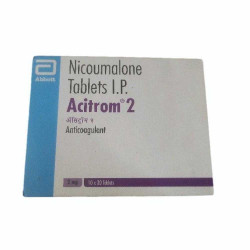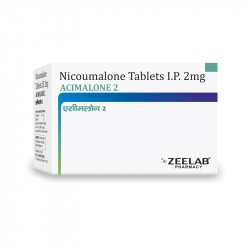Download India's most affordable pharmacy app
- Compare with medicine prices
- Save upto 90% on your medicine bills
COMPOSITION:
Acenocoumarol (2mg)DESCRIPTION:
Acitrom 2 Tablet contains Acenocoumarol (2mg) and is prescribed for the prevention and treatment of blood clots in medical conditions such as deep vein thrombosis (DVT), pulmonary embolism (PE), atrial fibrillation (AF), and after certain heart valve surgeries. It belongs to the class of oral anticoagulants (blood thinners) that reduce the risk of life-threatening events like stroke or recurrent venous thrombosis by interfering with clot formation in the body. The medicine works by inhibiting the synthesis of vitamin K–dependent clotting factors in the liver, making blood less likely to clot. It requires regular monitoring through INR (International Normalized Ratio) blood tests to ensure an optimal balance between preventing clot formation and avoiding excessive bleeding. Common side effects include easy bruising, prolonged bleeding, bleeding gums, or nosebleeds. The tablet should be taken at the same time each day, without changing the dose unless advised by a healthcare provider. Avoid Acitrom 2 Tablet if allergic to Acenocoumarol or similar anticoagulants. Patients with active bleeding, severe liver disease, uncontrolled hypertension, recent surgery on the brain or spinal cord, or a history of major bleeding should inform their doctor before use. It is not recommended during pregnancy, though it may be used cautiously during breastfeeding under medical supervision. Alcohol should be limited, as it may interfere with INR control.
Uses of Acitrom 2 Tablet
Acitrom 2 Tablet is used in the prevention and treatment of blood clots. The detailed uses of Acitrom 2 Tablet are as follows:
- Stroke Prevention: Reduces the risk of stroke in patients with atrial fibrillation.
- Treatment of DVT and PE: Prevents recurrence and supports recovery from deep vein thrombosis and pulmonary embolism.
- Post-Heart Surgery Protection: Helps prevent clot formation after heart valve replacement surgery.
- Long-Term Clot Control: Suitable for long-term prevention in patients prone to recurrent clotting events.
Benefits of Acitrom 2 Tablet
- Prevents harmful blood clots that can block circulation.
- Reduces the likelihood of stroke and other clot-related events.
- Essential for post-surgical clot prevention in high-risk patients.
- Effective for both acute and long-term anticoagulation needs.
How Acitrom 2 Tablet Works
Acitrom 2 Tablet contains Acenocoumarol, which blocks the liver’s use of vitamin K in producing clotting factors II, VII, IX, and X. By reducing these clotting proteins, the medicine slows clot formation, allowing blood to flow freely and lowering the risk of stroke, pulmonary embolism, or recurrent deep vein thrombosis.
How to Take Acitrom 2 Tablet
- Take exactly as prescribed, at the same time daily.
- Can be taken with or without food; maintain consistency.
- Swallow whole with water; do not crush or chew.
- Follow INR testing schedules and never change doses on your own.
Side Effects of Acitrom 2 Tablet
Common side effects
- Easy bruising
- Nosebleeds or gum bleeding
- Prolonged bleeding from cuts
- Fatigue or mild weakness
Serious side effects
- Unexplained bleeding in urine or stools
- Coughing up blood or vomiting blood
- Sudden severe headache or weakness
- Allergic reactions (swelling, rash, difficulty breathing)
Seek urgent medical attention for severe reactions.
Safety Advice
- Alcohol – Limit or avoid; it may disrupt INR control and raise bleeding risk.
- Pregnancy – Avoid during pregnancy due to risk of fetal harm.
- Breastfeeding – Use with caution; consult your doctor.
- Driving – Safe unless you feel dizzy or weak.
- Kidney – Use cautiously; dose adjustments may be needed.
- Liver – Avoid in severe liver disease; regular monitoring required if used.
Frequently Asked Questions
Q: Can I take Acitrom 2 Tablet on an empty stomach?
A: Yes, but take it at the same time daily for stable INR control. Food is not required for absorption, but consistency helps maintain predictable anticoagulant effects and reduces the risk of INR fluctuations.
Q: Is Acitrom 2 Tablet safe for long-term use?
A: Yes, it is frequently prescribed for long-term use in patients with chronic clotting risks. However, regular INR testing and medical follow-up are essential to avoid both clotting and excessive bleeding.
Q: Can I stop taking Acitrom 2 Tablet if I feel better?
A: No, stopping suddenly without medical advice can cause dangerous blood clots or stroke. Your doctor will advise on tapering or switching if therapy needs to end for any reason.
Q: Does Acitrom 2 Tablet cause weight gain?
A: Weight gain is not a common side effect. Any noticeable weight changes may be related to fluid retention, reduced mobility, or underlying health issues and should be assessed by a doctor.
Q: What should I do if I miss a dose of Acitrom 2 Tablet?
A: Take it as soon as you remember unless it’s almost time for your next dose. Never double dose, as it could sharply increase your bleeding risk, particularly with high INR levels.
Q: Can Acitrom 2 Tablet be taken with other painkillers or blood thinners?
A: Only with strict medical supervision. Combining with NSAIDs, aspirin, or other anticoagulants can greatly increase bleeding risk and should be done only under monitored clinical guidance.
Q: Are there any common side effects of Acitrom 2 Tablet?
A: Yes, minor bleeding episodes such as gum bleeding, nosebleeds, or easy bruising may occur. These are common but should still be discussed during routine INR review appointments.
Q: Is Acitrom 2 Tablet suitable for elderly patients?
A: Yes, but they require more frequent INR checks because they are often more sensitive to dose changes and are at higher risk for both clotting and bleeding complications.
Q: Can Acitrom 2 Tablet be taken during pregnancy or breastfeeding?
A: It is not safe during pregnancy due to fetal risk. During breastfeeding, it should be taken only after medical assessment to ensure minimal exposure to the infant.









 Added!
Added!